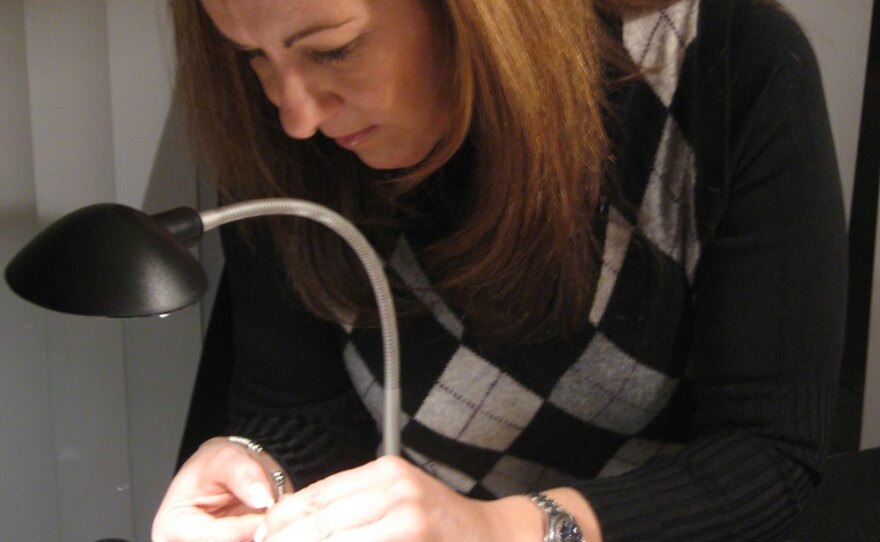Since the housing market crash, two-thirds of registered mortgage brokers have lost their jobs. Now in new career fields, two former brokers look back on their role in the subprime mortgage and foreclosure crisis with a mix of regret and resentment.
Riding A New Wave
In a dining room, Laurie Souza is turning over a ring under a magnifying glass. "I can tell it's gold," she says. "I can see the 'K,' it's just worn off." Two dozen people are looking on. She weighs and sorts by gold bracelets, earrings, tie tacks, and then makes out a check to the owner.

"Three-hundred dollars," Souza says. "Not bad."
A year ago, Souza started a company called Gold to Green that organizes gold parties. Homeowners invite their friends and neighbors over to sell unwanted jewelry. Gold is fetching premium prices right now, and Souza's company is expanding fast. She has hired 20 people, many of them former mortgage brokers, like her.
"We're basically riding a gold bubble that came after a housing bubble," Souza says, "and when this is done, I have no idea what's going to be next. But I'm riding the wave."
Souza used to ride the subprime wave as a mortgage wholesale representative. She was good at it, and she made a good living — $800,000 in her best year during the housing boom.
"I miss it," she says.
When the housing market crashed, so did the job market for mortgage brokers, the middlemen between lenders and homebuyers.
I wish some of these borrowers would be held responsible. I don't feel bad for those people.
Souza says it's not fair to blame brokers for the housing mess. She says homebuyers were either fraudulent or lazy.
"I wish some of these borrowers would be held responsible," Souza says. "I don't feel bad for those people. I'm sorry, I don't. You bought the biggest thing in your life and you had all this time to understand it, and you didn't! You know, how is that our fault?"
She says mortgage professionals did their due diligence, save for a few bad apples.
Humbler And Happier
Nowadays, former mortgage broker Craig Good runs a fruit stand at the Old South Meeting House in downtown Boston.
Back when he sold mortgages, Good used to make up to $400,000 per year. He opened offices all over Massachusetts and was expanding into Florida.
"I was greedy," Good remembers. "Boy, I was greedy. And when I came to that conclusion — you know what? — it wasn't awesome."
Good says he served as a matchmaker, a conduit between aggressive lenders and risky borrowers, because that's where the money was. He says he did help deserving people get into homes. But Good feels remorse for his part in what he calls the obesity of the time.
Boy, I was greedy. And when I came to that conclusion -- you know what? -- it wasn't awesome.
"There was a lot of excess," he says. "No irony, I'm 215 pounds now, I was 235, 240 pounds back in those days, because, you know, we were eating at good places and we were living the good life."
Nowadays, he's not living as large. He earns an eighth of what he used to. But unlike the mortgage business, what he's doing now makes people happy each day, he says. Before, if someone complained, it's not like he could redo a mortgage. But now, he can hand out another mango. Good says he'd rather teach his son the fruit business than the mortgage business.
"For a long period of time I was glad-handing, rubbing elbows, saying hi, smiling — and there wasn't a lot of people that trusted the authenticity," Good says. "Now I wear four-year-old sneakers instead of four-day-old sneakers — and you know what? I know more about me now than I was ever willing to commit to looking at in those days."
Both of these onetime mortgage professionals, Craig Good and Laurie Souza, say they would go back into the business if the mortgage industry recovers. Good says he would do it differently. Souza says she's afraid that with the new rules and regulations that have made the business more cumbersome and costly, it won't ever be like it used to be.
Copyright 2022 WBUR. To see more, visit WBUR. 9(MDAzMjM2NDYzMDEyMzc1Njk5NjAxNzY3OQ001))





